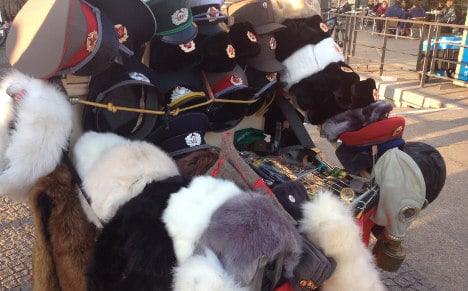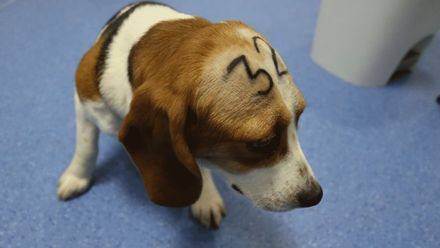Anyone who has walked through Berlin's Alexanderplatz on a clear afternoon will be familiar with the odd combination of souvenirs on offer.
A communist style cap, anyone? How about a gas mask? Or perhaps a fluffy fur hat with ear flaps to keep out Berlin's chilly autumn air?
On Monday morning, a BZ reporter visited Alexanderplatz and came away with two fur hats.
The vendor claimed it was dog fur – and analysis from Tim Giesecke, consultant at the Berlin Association of Peltmongers, suggested this was true.
The import, export and sale of dog fur is banned in the EU – and on Tuesday, police confronted the vendor and seized his goods.
Accused of violating Germany's ban on dog fur trading, he will face a fine if found guilty.
Authorities have to 'inspect' furs
Alexanderplatz is usually alive with souvenir hat stands – but when The Local travelled to the popular tourist spot on Wednesday, not a single one was in sight.
A short walk away came a disgruntled explanation.
Muhammed Sarwar sells fur hats from a stand near Berlin Cathedral.
His stall usually boasts an array of rabbit fur hats, popular with tourists – but today, it's only artificial fur on offer.
This week, authorities confiscated much of Sarwar's stock.
“They said they had to inspect the furs, and asked me where I'd imported them from,” he said. “I didn't have any evidence of that because I bought the fur here in Germany.”
Sarwar begged officials not to take away his stock away.
“I said “please, please, they're not new goods, they're made from old fur,”” he remembered.
“I hope they'll give them back to me soon, because this is how I make my living.”
Showing The Local has street trading licence, he pointed out the words “Pelzmütze” (fur hats).
“See, I'm allowed to sell fur hats here,” he explained. “I paid for this licence.”
Artificial fur hats like these are all Sarwar has left to sell, he says. Photo: Hannah Butler
'It's theft, what they've done'
Many hat sellers have had their goods confiscated this week, Sarwar said – which explains why Alexanderplatz was so empty on this grey Wednesday afternoon.
Sarwar wasn't sure whether the street vendor in question was selling dog fur.
“He was a newcomer from Pakistan,” he told The Local – adding that the man could have falsely claimed it was dog fur without understanding the legal consequences.
Sarwar doesn't import any fur from abroad, he said.
Instead, he buys coats from Berlin flea markets and sends these to colleagues to be made into hats.
“It's painful for me to have all my goods confiscated, ” he said. “Everything I was selling when they confiscated my stock was made from coats we bought at flea markets.”
“It's actually theft, what they've done.”
Tourists still come to Sarwar and ask for real fur hats, he says – including dog fur. Photo: Hannah Butler
Peta: no reason to buy these products
According to animal protection organisation Peta, dog fur trading is a big issue in Berlin.
“Temporary traders rarely appear in the same place for long enough that their illegal activity can be stopped,” Edmund Haferbeck, head of Peta Germany's academic and legal department, told The Local.
Dog and cat fur imported from China is often cheaper than artificial fur, he explained – and with no animal protection laws in China, “conditions there are gruesome.”
Numerous investigations in China have shown the torturous ways these furs are obtained, he said.
“There's no sensible reason to buy these animal cruelty products,” Haferbech told The Local. “Especially in European countries where fur clothing isn't necessary for warmth.”
'Fur doesn't belong in the fashion scene'
The German Animal Protection Association also slammed the practice.
“Fur production is always extremely distressing and painful for the animal,” spokesperson Lea Schmitz told The Local.
Even though most dogs don't live in cramped cages, as is often the case in industrial fur production, the killing methods are just as cruel, she said – adding: “the animals are sometimes skinned alive.”
It's not just the trade in dog and cat fur the Association wants to end.
“Only through a total boycott of fur products can we make sure that no animals die under agonising conditions,” Schmitz explained.
“Anyone who buys these products supports the brutal practice of fur trading.”
Because it's often difficult to tell whether a product is made of real or artificial fur, the Association recommends that people avoid fur products altogether, Schmitz said.
“This is the only way for consumers to show the fashion industry that fur isn't socially acceptable, and doesn't belong in the fashion scene.”
By Hannah Butler



 Please whitelist us to continue reading.
Please whitelist us to continue reading.
Member comments